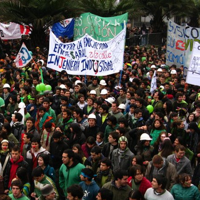Last Thursday will likely be remembered as a low point for Chilean President Sebastián Piñera. Police clashed with students during an unauthorized protest, inviting unflattering, if exaggerated, comparisons to the military dictatorship of Augusto Pinochet. The same day, the Center for Public Studies -- known by its Spanish acronym, CEP -- released a poll finding that Piñera's popularity had dropped to just 26 percent, the lowest level of any Chilean president since the return to democracy in 1990.
The two events were hardly coincidental. Like his predecessor, former President Michelle Bachelet, who faced student protests of similar magnitude in 2006, education reform is turning out to be one of Piñera's most intractable political problems.
While Piñera struggles with an image problem and rock-bottom approval ratings, the students have captured international attention for the creativity of their protests. Students have assembled in public to kiss for 1,800 seconds, a symbolic reference to the $1.8 billion in annual state investment they demand in order to guarantee access to quality, free education. They have similarly run 1,800 laps around La Moneda, Chile's equivalent of the White House, to drive the same point home. At another demonstration, a flash mob gathered to perform the choreography of Michael Jackson's "Thriller" video in Santiago.

